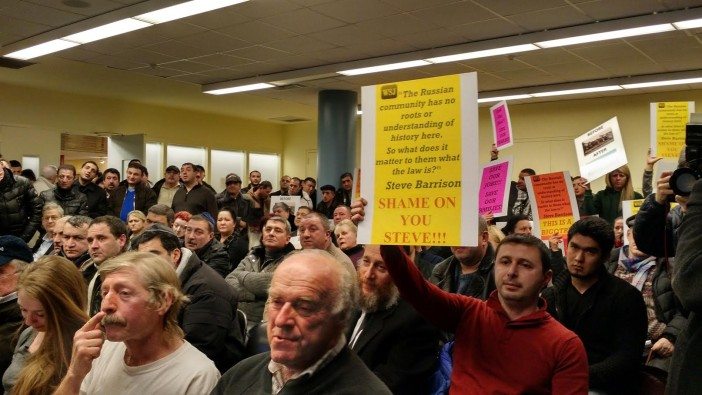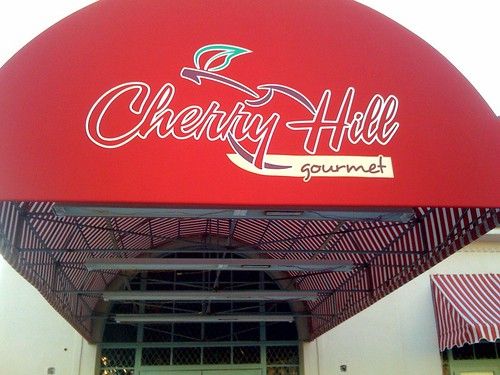Amid Allegations Of Bigotry And Criminality, Cherry Hill Market Wins Support For Legalization


Despite six years of operating outside of the law, Cherry Hill Gourmet Market achieved a decisive win last night when Community Board 15 voted to support its request to change the zoning of the historic Lundy’s building (1901 Emmons Avenue) and legalize its use as a food market.
The market’s owners organized a strong showing, packing the room with dozens of sign-holding employees and a handful of supportive patrons, who booed down community activists who opposed changing the 42-year-old Special Sheepshead Bay Zoning District to allow such markets. Ultimately, the proposal to amend the zoning text passed the Board 20 to 2.
Emmons Avenue is one of just a handful of special zoning districts designated by the city, and since 1973 has limited much of the corridor’s business uses to “waterfront and tourist-related activities.” The proposed amendment changes the language to allow markets inside only the Lundy’s building.
The owners and its supporters said that the special zoning district has failed to bring the desired businesses to Emmons Avenue, while the market has revitalized the space and contributed to the community.
“I remember Lundy’s being closed for almost 20 years. The graffiti, the dirt, the grime. The community has changed. I appreciate everything Steve Barrison has done throughout the years,” said Cherry Hill’s manager Sam Nitka, referring to the Bay Improvement Group president who is a vocal opponent of the zoning change. “Things change. Just because we want to legally revise a law doesn’t make us bad people … Sheepshead Bay has changed. We love the community. We have a cafe, we have a restaurant, we sell produce. We employ people. We pay taxes.”

Employees pleaded to boardmembers to support the proposal, saying that they would be out of jobs if the market wasn’t legalized.
“I understand there are people saying that [owner David Isaev] is a lawbreaker and everything else, but it’s no longer about him breaking the law. It’s about people who are going to lose their jobs. I have three family members of my own that I have to take care of. If we happen to lose this, well, it’s not a good thing,” said produce manager Eric Winter. “So it’s not about breaking the law anymore. It’s about the families that are working for Cherry Hill … so please, help us.”
It wasn’t clear why legalization is necessary to the business’ viability. Having operated for six years, the property’s attorney said that it was a strong business enterprise that is not at risk of bankruptcy. Nitka, however, told Sheepshead Bites that it jeopardizes their lease.
“The non-conforming use gives the landlord the right to void the lease,” said manager Sam Nitka. He did not say if that was a current risk, and indicated during his statement to the board that they enjoy the landlord’s support. (However, the landlord does contract out leasing to a management company.)
“The city can come down and shut you down,” Nitka added.
The city previously told Sheepshead Bites that there was little precedent for shutting a business down unless it poses a health or safety risk.
Cherry Hill supporters also depicted it as a civil rights battle, saying the market’s opponents – especially Bay Improvement Group President Steve Barrison – want them out because they’re Eastern European. Many held signs baring a 2011 quote from Barrison in which he suggested to a Wall Street Journal reporter that the Russian community gives Cherry Hill a pass because they have “no roots or understanding of history here.”
The signs naming Barrison read “This is a bigotry!”

“Today is my Selma!” said Raisa Chernina, a Community Board member, likening the battle for a fruit market’s legalization to the 1965 marches in Selma, Alabama, in which hundreds of unarmed men, women and youth were violently beaten by police, and at least one murdered by vigilantes, and which ultimately led to the Voting Rights Act of 1965.
(The zoning struggle was previously described by Cherry Hill’s owner as “worse” than the war in Afghanistan, in which more than 3,000 coalition servicemembers and 21,000 civilians were killed.)
“I live in this area more than 20 years. I’m in this country 35 years … It’s not my fault I wasn’t born here. It’s not my fault I don’t know the roots of this area,” Chernina said.
Opponents of changing the zoning, though, say it’s not about ethnicity or the market’s popularity. Instead, they said, it’s about preserving a zoning district meant to encourage public waterfront recreation and not about changing demographics.
“Zoning has been designed so that everything works together … are you suggesting we throw out the zoning because certain uses or demographic or immigration changes happen?” said Barrison. “The special district zoning is designed to last 150 to 250 years, long when we’re all gone. Maybe it’ll be all Asian here. Maybe the Turkish people that are moving in will take over. This is about waterfront … this isn’t a popularity contest.”
Barrison also suggested approving the zoning change would reward a business that scoffed at the law, giving it an unfair advantage over those markets who’ve followed it.
“It’s about permitting the laws to be followed, and every single one of you would like the law followed when it applies to you, your house, your business and everything else. Respect the future … this is about a lot more jobs than in just one place,” he said.
Barrison and the Bay Improvement Group were joined in opposing the proposal by the Manhattan Beach Community Group, the Sheepshead Bay – Plumb Beach Civic Association and the Madison-Marine-Homecrest Civic Association.
Councilman Chaim Deutsch also said he did not approve of the plan the way it was written – or an amendment offered by Borough President Eric Adams to limit the legalization only to the current square footage within Lundy’s that Cherry Hill occupies. He said, however, that he is working with Cherry Hill’s owners to find a compromise.
Two members of the Board supported tabling the proposal, which would forfeit its right to comment on the plan to the Department of City Planning. In an attempt to force the tabling, the pair – Cliff Brukenstein and one other – walked out during the vote, shattering the quorum required to take a vote. However, the Board’s secretary, Allen Popper, determined that since the quorum was established earlier in the meeting during roll call, the quorum remained.
The Board’s vote of support is advisory only, and its recommendation will be sent to City Planning. After a determination by that agency, the proposal will go for a full vote before the City Council.
Correction (February 8, 2015): The original version of this article indicated Morris Harari, a member of the Board, left with Cliff Brukenstein during the vote. He did not, and it was another member who left. We apologize to Harari and our readers, and regret the confusion.




